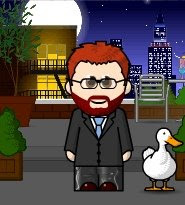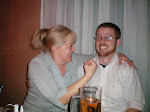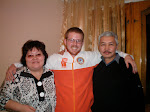I believe I’ve mentioned that part of my job is training teachers, though I rarely actually do it. The reason for that is the nature of the institute that I am shared with, along with my school where I team-teach 24 lessons a week. The Professional Development Institute (PDI) has periodical conferences and training seminars where they invite teachers from all over the city and the surrounding oblast to come be trained. As they only have several set seminars and conferences a year, there isn’t a set, weekly schedule that I can operate by in my dealing with them. They simply invite me when there is an event that they would like me to help with. I did my first session back in December or January, and hadn’t even talked to my PDI counterpart until last week. She wanted me to come and lead some activities for the current round of teachers doing a weeklong conference. I gathered some plans together, focusing on speaking and writing activities to use in the classroom, and conducted two one-hour sessions. Last weekend I also had a teacher training conference, but in a village called Mamlutka, where Sarah (Kaz-18) works. It also happens to be the northern most PCV site in the world. Pretty cool. With this flood of trainings, I thought I should give a more detailed explanation of what exactly we do in these conferences.
During PST down in Almaty we received training both in language and teaching, but also in leading training workshops for local teachers. PC, in its official stance, supports and promotes what is called the “communicative approach” to teaching language. As I had read in material before coming to KZ, many teachers here tend to have a read, repeat and translate method of teaching. This means the teacher gives tasks that demand the student to read a list of new words and their Russian meanings, repeat the words orally after the teacher, and translate a text that contains those new words. With some small dialogues (usually memorized) or some conversation (usually with many prompts) activities scattered in, that is basically a teacher’s whole career. The communicative approach stresses speaking, speaking, and speaking. The basic idea is that language are learned and used in order to communicate in every day situations and to learn about new places, people and cultures – not to translate texts about the environment or the international partnerships of KZ. We came to site armed with 3 months of training and a binder full of communicative activities that throw the local techniques and textbooks out the window. Games and activities where students must listen to each other for responses to complete a task, problem solving tasks where students must “manage ambiguity” as a language trainer from the US Embassy in Astana told us at In-Service Training earlier this month. As she explained, all of real language use, especially if you are new in the language, is about managing ambiguity, or figuring out what the heck someone said when you don’t understand all the words used. An example of a non-communicative question is, “What color is my shirt?” The teacher, asking the student and hoping for the grammatically correct, “Why teacher, your shirt is light blue,” overlooks the fact that no one would ever ask that question in real life. In a more communicative situation, the teacher might ask, “What do you think of my shirt?” or “What is your favorite color and why?” Another, somewhat humorous, example is a lesson where the theme is professions. The teacher puts a list of five popular professions on the board and has the students read and repeat them. She then asks the students in turn, “What do you want to be when you grow up?” One boy asks, in Russian, “How do you say race car driver?” Race car driver is not on the list. The teacher says, in Russian, “Please pick one from the list.” As you can see, sometimes teachers can get so focused on teaching the material that they don’t leave any room for the student’s ideas, preferences and interests. Unfortunately, many English classrooms in KZ are teacher-centered classrooms where the teacher spends the most time talking, exhibiting their expertise, handing knowledge to the quiet, note-taking students. We try to emphasis a student-centered classroom where the students’ voices, full of pronunciation errors and grammatical mistakes, dominate the classroom. The student-centered classroom is loud, with many people speaking at once, but with the teacher asking questions and drawing the students out of their comfort zones and into a language learning experience. And I can assure you, learning a language in an effective dive-right-in manner is anything but comfortable.
I ended this week have taught a total of 30 teachers for 4 hours about haikus and role playing, creative stories, telephone, taboo and other activities they can use instead of the nationally issued text book speckled with errors and uninteresting topics. At the end of the last two sessions, I was highly praised and asked to come back for the next session. I even had some teachers offering to find me a nice local girl. After a couple months of wondering if I actually worked for PDI, if teacher training was actually part of my job, I was rewarded with a productive and successful series of seminars. Now if I can get them to stop saying, “I’ll phone to you tomorrow.”
Subscribe to:
Post Comments (Atom)
.jpg)








2 comments:
"the northern most PCV site in the world. Pretty cool." I'll bet!
Great entry, Felipe: informative detail. Did any of the teacher-students role-play student-students?
I thought Mexico had a monopoly on mañana; guess not.
What a great blog today, Philip. We're always so glad to hear from you. We learned something new--that "haikus" is a kind of poetry (had to look it up on the internet).
Do you think you might want to teach when you come back home? Seems to us you will be able to help your students enjoy learning. You really are having some wonderful experiences.
Your cousin Jessica graduated yesterday Cum Laude from FSU. Deedee and Pat were there. She'll be home for about a month and then plans to be a world traveler. Shannon will be home next weekend and after a week or so goes to Greece with a group of students from College of Charleston, plus sponsors (a husband and wife).
Shalom,
Grandmommie and Granddad
Post a Comment